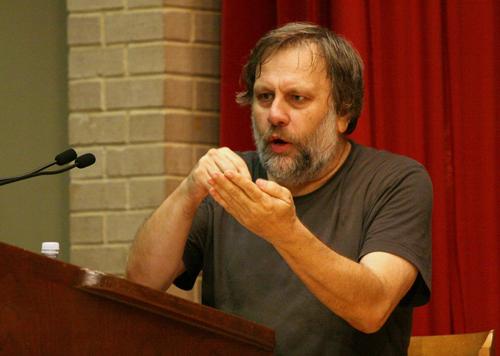About 700 people packed themselves into Nunemaker Hall and overflow rooms in order to hear philosopher Slavoj Zizek speak on Nov. 17.
He touched on topics ranging from art to government, from religion to war, from the Palestinian-Israeli conflict to pornography.
“He works in so many different fields,” said language professor Josefa Salmon, citing psychology, philosophy and film.
This is one of the reasons she asked that he come speak at Loyola, she said.
Two of the people responsible for making Zizek’s appearance possible were Salmon and philosophy professor John Clark.
Salmon said she and Clark asked Zizek in April to lecture at Loyola.
“It took him a while to answer, and then he said yes,” she said.
It wasn’t until after he accepted that Clark and Salmon began writing proposals to fund the lecture, which were fulfilled.
Zizek began his lecture, after a brief nod, which made the audience laugh to the T-shirts people were donning across campus, with a discussion of the difference between explicit and implicit rules in society and the way outside pressure teaches people to go against their human nature.
“If you really want to drink, you probably go to some stupid fruit drink, not alcohol,” he said using examples of a blunt, everyday tone that was present throughout his lecture.
Zizek was born in Yugoslavia in 1949 and made many references to the political climate of that time when he spoke about government and his experiences.
The primary focus of his lecture at Loyola was about the use of violence and how he believed it was effective or ineffective.
Zizek often made references to popular films to back up his ideas, explaining why he thought “The Sound of Music” was “obscene” and why characters in “The Shining” related to the Christian idea of a “neighbor.”
“He can connect with people on a level that makes them uncomfortable, but people can understand,” said political science junior Richard Tucker.
The lecture’s organizers had set up four overflow rooms with projection screens so those blocked out of the crowded Nunemaker Hall to avoid a fire hazard were still able to see and hear the lecture.
Due to tech issues only one of the rooms was able to pick up both the video and the audio of the speech.
All of the overflow had been concentrated to one room on the second floor of Monroe Hall, and much of the crowd chose to spill out into the hallway even though they couldn’t see the projector.
Mass communication major Erin Clements who was packed in with the rest of the overflow said the presentation of the speech on the projections screens was “perfectly adequate” and did not hinder her enjoyment of the speech.
Tulane law student Peter Morris, who also took in the lecture from a projection screen, was impressed as well.
“He renewed my interest in cultural theory,” said Morris.
As a law student he said that Zizek’s ideas sparked a lot of debate about political policies and system engagement.
Clark organized a panel of students and faculty for a separate dialogue with Zizek the day before his main lecture.
They read Zizek’s work for several months before meeting with him.
Political science junior Bryan Murphy was part of the panel and said, “there were no faculty-student pretensions,” during the dialogue.
“I think what I enjoyed most about this lecture tonight is the possibility that someone didn’t enjoy it,” Murphy said. “Zizek comes here and says, ‘I’m not here to tell you that everything is okay.’ I’m very excited that someone may have come out saying, ‘I’m very upset that he says things are not okay.'”
Hasani Grayson and Katie Urbaszewski can be reached at [email protected] and [email protected]








